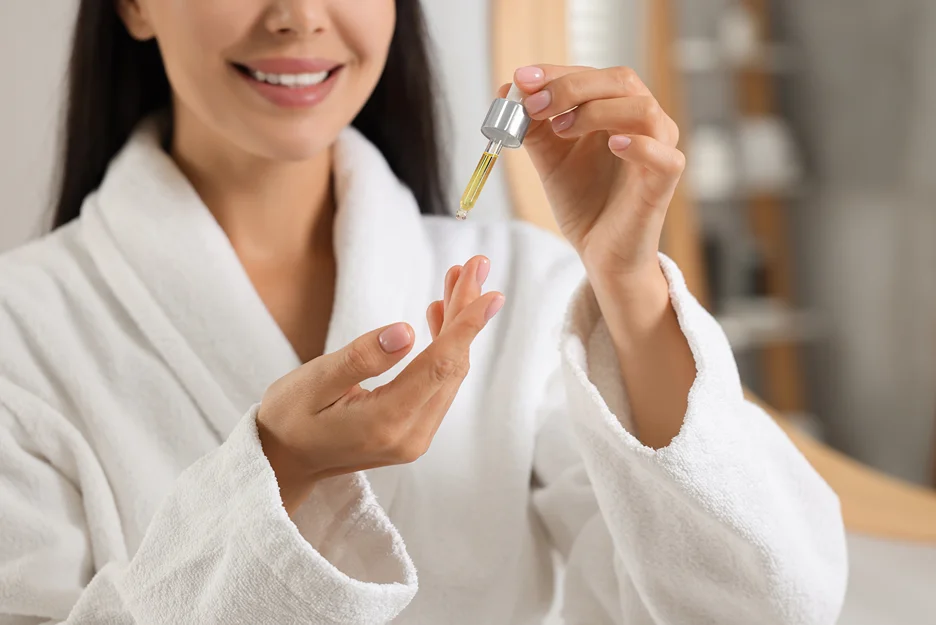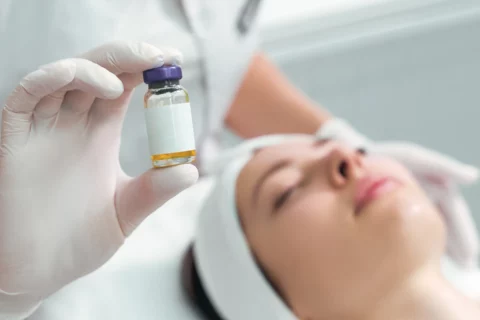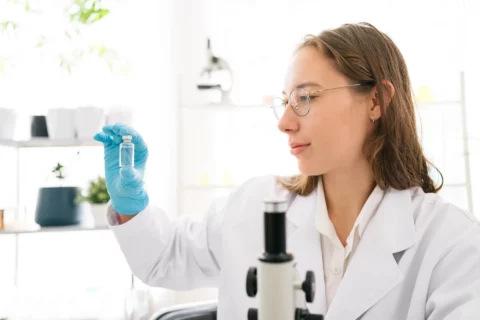An In-Depth Look at Exosomes for Skin Health and Rejuvenation
Exosomes are becoming a revolutionary technology in anti-aging and skincare treatments.
Current research is continuously revealing their potential, leading to their inclusion in an expanding variety of skincare products.
Experts at FACE Med Store are closely following these advancements, recognizing the significant impact exosomes may have on skin health.
Their role in skincare innovations is becoming increasingly important, marking a new era in beauty treatments.
Understanding Exosomes
Exosomes are tiny vesicles, almost like microscopic bubbles, produced by cells.
Despite their small size, measuring just 30 to 150 nanometers, these vesicles pack a potent punch.
They carry a mix of vital components such as lipids, proteins, DNA, and various forms of RNA, playing a crucial role in cell-to-cell communication.
Origins of Exosomes
Exosomes, created within cells, are released into the extracellular space.
Their vital mission as cellular messengers begins here, as they merge with or attach to target cells to deliver their contents.
This process is crucial for influencing the behavior and functions of other cells and facilitating important cellular interactions.
Exosomes in Skin Health

In the skin, exosomes are produced by cells in both the dermis and epidermis layers. They are pivotal in signaling and regulating a variety of skin functions such as cell growth, movement, and differentiation.
Impact on Skin Homeostasis
Our skin, which contains trillions of exosomes, depends on them for maintaining balance, defending against external pathogens, and ensuring normal cell function and health.
How Exosomes Elevate Skin Health and Appearance
Exosomes, derived from plants or human stem cells, are being used in creams, serums, and gels, as well as through injections. These skincare products and treatments are believed to offer significant rejuvenation and anti-aging benefits for the skin.
Key Benefits of Exosomes for Skin Care
- Boosting Collagen Production: Exosomes are rich in growth factors and signaling proteins that encourage fibroblast cells in the dermis layer to produce more collagen. This increase in collagen helps in plumping the skin and reducing the appearance of wrinkles.
- Enhancing Skin Elasticity: As we age, the production of collagen and elastin fibers diminishes. Exosomes aid in restoring skin elasticity and firmness by positively influencing these structural proteins.
- Promoting Skin Cell Regeneration: The nucleic acids within exosomes, such as mRNA and miRNA, play a role in regulating gene expression in skin cells. This regulation is crucial for cellular renewal and regeneration, leading to healthier skin.
- Accelerating Wound Healing: Exosomes can expedite the repair of both dermal and epidermal tissues following an injury. They activate key cells like fibroblasts and keratinocytes to close wounds and form new tissue.
- Reducing Inflammation: In the event of injury, exosomes help manage inflammation by modulating cytokine production. They also carry immunosuppressive factors that further aid in this process.
- Revitalizing Skin: Stem cell-derived exosomes possess proteins and genetic materials that overall rejuvenate the skin, enhancing its tone, texture, brightness, and giving it a youthful glow.
- Providing Antioxidant Protection: Exosomes are equipped with antioxidants that help combat oxidative damage caused by UV exposure and environmental pollutants, protecting the skin from premature aging.
- Improving Hydration: By boosting hyaluronic acid synthesis and accelerating skin cell turnover, exosomes enhance the skin’s ability to retain moisture. This results in visibly plumper and more supple skin.
Stay Ahead in Beauty with FACE Med Store – Exosome therapy is the future. Be the first to know, be the first to glow!
What Does Science Say About Exosomes for Skin?

Several scientific studies have explored the impact of exosomes on skin cells and their capacity for repairing and regenerating the skin. The following is a summary of some of the key discoveries:
- Stem Cell-Derived Exosomes in Skin Repair and Wound Healing: Research has shown that exosomes from stem cells are promising in skin repair and healing wounds. These exosomes carry proteins and RNA that can significantly promote the regeneration of skin cells.
- Efficacy in Skin Conditions: Mesenchymal Stem Cell Exosomes: Exosomes from mesenchymal stem cells have been extensively studied for their effectiveness in treating skin conditions. Their anti-inflammatory properties and ability to aid in wound healing have been documented in various studies.
- Potential Therapeutic Applications: The existing literature indicates that exosomes may be a feasible therapeutic alternative for various skin-related problems. However, more research is needed to fully understand their therapeutic value in cosmetics, skincare, and tissue regeneration.
- Role in Chronic Skin Inflammation Conditions: Studies are exploring the role of exosomes in chronic skin conditions, such as those related to diabetes. These studies focus on understanding how exosomes contribute to cell signaling and metabolism in such conditions.
- Exosomes in Hair Loss Treatment: Preliminary studies have suggested that exosomes might be an effective treatment for hair loss conditions. However, further clinical trials are necessary to confirm their efficacy and safety.
- Broad Spectrum of Exosome Research: The research on exosomes spans from understanding their basic composition and functions to pioneering new therapeutic applications in skin repair and rejuvenation.
While a lot of the research is still in its early stages, the current scientific evidence supports the potential for exosomes to greatly enhance skin health, reverse aging, and accelerate healing. Additional clinical trials are ongoing to further confirm effectiveness and safety.
Lead the Way in Skincare Innovation with FACE Med Store—Get exclusive access to the latest on exosome therapy!
How Do Exosomes Compare to Other Cutting-Edge Skincare Technologies?
Exosomes represent an exciting new application of biotechnology in skin care, but how do they compare against some other popular cosmeceutical ingredients like retinoids, peptides, and stem cells? Let’s take a look:
- Retinoids (e.g., Tretinoin and Retinol): These are known for increasing cell turnover and boosting collagen production, but they often come with side effects like redness, peeling, and irritation. Exosomes, on the other hand, work at a more profound cellular level and tend to have minimal side effects, making them a gentler yet effective alternative.
- Peptides (e.g., Matrixyl): While peptides are designed to mimic collagen and elastin, reducing wrinkles and signs of aging, exosomes offer a broader approach. They modulate multiple aging mechanisms simultaneously, addressing various aspects of skin aging more holistically.
- Stem Cells: Topically applied stem cells are aimed at stimulating skin repair through undifferentiated cells. Exosomes derived from stem cells, however, provide a more targeted delivery of regenerative signals, bypassing some of the sourcing and stability challenges associated with stem cell therapies.
- Growth Factors: Directly stimulating skin cells, growth factors are integral to many anti-aging products. Exosomes contain a natural mix of growth factors, potentially offering more balanced and refined signaling to the skin cells compared to isolated growth factor applications.
Overall, exosomes leverage the innate communication pathways cells use physiologically for skin repair. This may make them more integrated, holistic, and biologically compatible than individual ingredients that directly stimulate skin cells.
What Are the Potential Challenges or Concerns with Exosome Skin Therapies?
As an emerging technology, exosome skin care does come with challenges and open questions that still need to be addressed:
Understanding Exosome Content and Functionality
The specific composition and function of miRNA, mRNA, proteins, and lipids within exosomes are not yet fully understood.
It’s necessary to identify these natural ingredients precisely to avoid the inclusion of potentially harmful substances like damage-associated molecular patterns (DAMPs).
DAMPs, or alarmins, are released from injured tissues and can initiate inappropriate immune responses, potentially leading to diseases like autoimmune disorders, cardiovascular diseases, and neurodegenerative diseases.
Standardization and Validation
The process of standardizing, scaling, and validating exosome therapies for clinical use faces significant hurdles.
Despite advancements in isolation techniques, there is no established gold standard yet.
The challenge lies in simplifying the isolation process, reducing costs, and enhancing the purity of exosomes.
Mass Production of High-Quality Exosomes
For therapeutic applications, there’s a need to mass-produce high-quality exosomes.
However, current culture and isolation methods present challenges in this regard.
Developing a multi-functional system that incorporates efficient isolation techniques along with real-time quantification and analysis technology is essential for improving production efficiency.
Effective Preservation Methods
The future of personalized skincare may involve exosome-based products tailored to individual skin types and conditions. This necessitates effective preservation methods for exosomes.
Current techniques include storing them below −70°C and freeze-drying using cryoprotectants.
However, the effectiveness of these techniques for long-term preservation, especially for therapeutic and diagnostic purposes, still needs to be fully confirmed.
Discover the Future of Skincare with FACE Med Store

Stay ahead with us as we explore the innovative field of exosome therapy. Be the first to know about this exciting medical breakthrough, because when it comes to innovation in skincare, FACE Med Store is always at the forefront. Learn more with us today!






